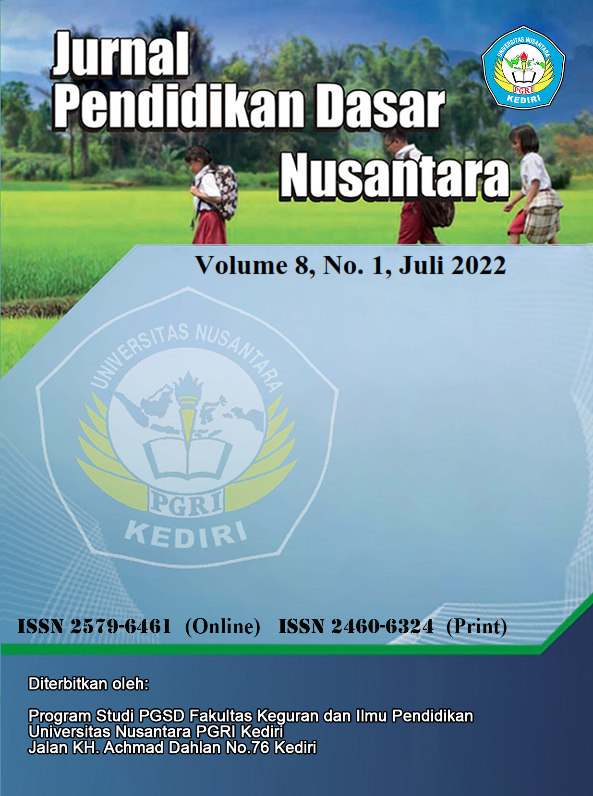BEHAVIORAL IMPACT OF IMITATING ONLINE GAME SAKURA SCHOOL SIMULATOR
DOI:
https://doi.org/10.29407/jpdn.v8i1.18069Keywords:
online games, imatating social behaviorAbstract
Abstract :This research was conducted against the background of the impact on students playing the online game sakura school simulator on changes in social behavior imitating elementary school students. The purpose of this study was to determine the impact of students playing the online game sakura school simulator on the social behavior of imitating students at Madarasah Ibtidaiyah. This study uses qualitative methods with case study instruments, collecting data from online game players through direct observation, interviews and documentation. Based on the results of the study, it was concluded that playing the online game sakura school simulator had an impact on imitating social behavior in students. Children are very easy to imitate or imitate a model that is found and desired to be imitated. The results of imitating the online game sakura school simulator can be shown directly or in the future. The procedures carried out in the imitation process include (1) the process of paying attention, (2) the process of remembering, (3) motor reproduction, and (4) the reinforcement and motivational process.
Keywords: online games, imitating social behavior
Downloads
References
Barida, M. (2016). PENGEMBANGAN PERILAKU ANAK MELALUI IMITASI, 03(3), 13–20.
Ganda, N., & Hidayat, S. (2021). PEDADIDAKTIKA : JURNAL ILMIAH PENDIDIKAN GURU SEKOLAH DASAR Dampak Game Online Free Fire pada Siswa Sekolah Dasar, 8(4), 840–850.
Gerry F. Kapoh. (2015). PERILAKU SOSIAL INDIVIDU PEMAIN GAME ONLINE “PERFECT WORLD” DI DESA SEA SATU, (15), 1–17.
Hurlock, B. elizabet. (2004). Perkembangan anak. Jakarta: Erlangga.
Ismi, N., & Akmal, A. (2020). Dampak Game Online Terhadap Perilaku Siswa di Lingkungan SMA Negeri 1 Bayang. Journal of Civic Education, 3(1), 1–10.
Kartikasari, M. P., & Yenny, Y. (2017). Pengaruh Drama India di Antv Terhadap Perilaku Imitasi Ibu-Ibu Rumah Tangga di Kelurahan Kedung Baruk Surabaya. Jurnal Kajian Media, 1(2), 86–96.
Lesilolo, H. J. (2019). Penerapan Teori Belajar Sosial Albert Bandura Dalam Proses Belajar Mengajar Di Sekolah. KENOSIS: Jurnal Kajian Teologi, 4(2), 186–202.
Murni Yanto, & Syaripah. (2017). Penerapan Teori Sosial Dalam Menumbuhkan Akhlak Anak Kelas I Madrasah Ibtidaiyah Negeri 1 Rejang Lebong. TERAMPIL Jurnal Pendidikan dan Pembelajaran Dasar, 4(2), 65–85.
Ningrum, W. P., & Haenillah, E. Y. (2017). Bermain Pembangunan Meningkatkan Kemampuan Meniru Bentuk. pendidikan anak, 3(1).
Ondang, G. L., Mokalu, B. J., & Goni, S. Y. V. I. (2020). DAMPAK GAME ONLINE TERHADAP MOTIVASI BELAJAR MAHASISWA JURUSAN SOSIOLOGI FISPOL UNSRAT, 13(2), 1–15.
Purwanta, E. (2012). Motifasi perilaku. Yogyakarta: Pustaka Pelajar.
Puspita, R. H., & Rohedi, D. (2018). The Impact of Internet Use for Students. IOP Conference Series: Materials Science and Engineering, 306(1).
Razi, A. D., Siregar, M., & Zulkarnain, Z. (2018). Children Imitation on Daily Languages Family Counseling Perspective. ENLIGHTEN (Jurnal Bimbingan dan Konseling Islam), 1(2), 139–149.
Rois, N. (2019). Jurnal Pendidikan Agama Islam Universitas Wahid Hasyim Semarang. Jurnal Pendidikan Agama Islam Universitas Wahid Hasyim, 7(2), 184–198.
Sumadi, S. (2006). Psikologi pendidikan. Jakarta: Raja Grafindo Persada.
Surbakti, K. (2017). Pengaruh Game Online Terhadap Remaja. Jurnal Curere, 01(01), 28–38.
Ulfa, M. (2017). Pengaruh Kecanduan Game Online Terhadap Perilaku Remaja Di Mabes Game Center Jalan Hr.Subrantas Kecamatan Tampan Pekanbaru. Jom. Fisip, 4(1), 1–13.
Wahid, M., & Fauzan, A. (2021). Game Online Sebagai Pola Perilaku. Kinesik, 8(3), 275–283.
Yessi Paradina Sella. (2013). Analisis Perilaku Imitasi Dikalangan Remaja Setelah Menonton Tayangan Drama Seria Korea Indosiar. Ilmu Komunikasi, 1(3), 66–80.
Downloads
Published
Issue
Section
License
Authors who publish with this journal agree to the following terms:
- Copyright on any article is retained by the author(s).
- The author grants the journal, the right of first publication with the work simultaneously licensed under a Creative Commons Attribution License that allows others to share the work with an acknowledgment of the work’s authorship and initial publication in this journal.
- Authors are able to enter into separate, additional contractual arrangements for the non-exclusive distribution of the journal’s published version of the work (e.g., post it to an institutional repository or publish it in a book), with an acknowledgment of its initial publication in this journal.
- Authors are permitted and encouraged to post their work online (e.g., in institutional repositories or on their website) prior to and during the submission process, as it can lead to productive exchanges, as well as earlier and greater citation of published work.
- The article and any associated published material is distributed under the Creative Commons Attribution-ShareAlike 4.0 International License

































